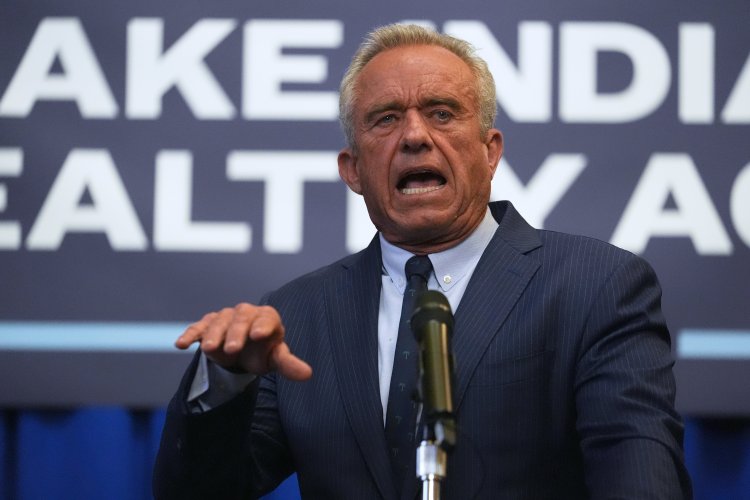"Whole Generation of Kids is Damaged": RFK Jr. Embarks on MAHA Tour
An Indiana weight loss coach expressed their enthusiastic agreement after watching Robert F. Kennedy Jr. speak, stating, “I just couldn't nod my head enough.”

Kennedy, who serves as the Health and Human Services secretary, discussed the current “crisis” of chronic diseases and autism, reflecting on a time during his childhood when the prevalence of illnesses like diabetes was considerably lower.
“This whole generation of kids is damaged by chronic disease,” he stated, while presenting erroneous statistics related to vaccines and obesity rates.
The duo made their appearance near the Indiana State Library to support Republican Gov. Mike Braun, who revealed nine executive orders connected to the MAHA initiative, including a request to the USDA for permission to prohibit soda and candy in the Supplemental Nutrition Assistance Program (SNAP), formerly known as food stamps. Concurrently, in Arkansas, Agriculture Secretary Brooke Rollins joined Republican Gov. Sarah Huckabee Sanders to announce a similar initiative.
These announcements highlight a growing bipartisan movement focused on promoting healthier lifestyles. In recent weeks, Kennedy has traveled to various Republican-led states, engaging with politicians, educators, students, Native Americans, and fans eager to support his fight against chronic diseases and his vision for reforming the American health system.
Two women, Allie and Kim, who wore green MAHA hats and opted to share only their first names due to fear of death threats, stated they would back Kennedy in a potential presidential run in 2028, given that Trump is constitutionally prohibited from running again.
“It’s absolutely marvelous because finally someone is going to take care of the American people, get the fluoride out of the water and the toothpaste, get that poison out of the food chain, that pesticides out of the crops, and the chemtrails out of the sky,” Allie remarked.
Kennedy has faced criticism and protests for his disconnect between high-minded rhetoric and his repeated promotion of a debunked theory linking vaccines to autism. This occurs against a backdrop of significant cuts during the Trump administration, with over $11 billion slashed from health funding and potential further reductions anticipated from Republican lawmakers.
Amid the protests, one demonstrator donned a tinfoil hat, another held a sign that read “Bobby Jr Hates: TEETH Loves: Preventable Diseases,” and an activist dressed as a dinosaur decried what they termed “Jurassic-sized cuts” to the National Institutes of Health.
Yet, Kennedy's agenda has garnered enthusiasm among Republicans, evident from West Virginia Gov. Patrick Morrisey’s previous collaboration with Kennedy to announce that his state would become the first to ban most artificial food dyes. Kennedy also praised Utah Gov. Spencer Cox for his state’s pioneering ban on fluoride in drinking water.
This shift within the GOP reflects a significant change in its general stance, which has traditionally resisted government interventions that dictate citizens' diets and lifestyles. Braun acknowledged this tension, asserting that “this isn’t the usual top-down, one-size-fits-all public health agenda,” while promoting executive orders that would limit the food options available to people using public funds and implement fitness testing for students.
“This is a monumental day, not just in Indiana, but for this great nation, because nine executive orders addressing MAHA initiatives I think breaks the record,” said Oz, a heart surgeon-turned-daytime television personality who now manages the nation’s largest health insurance programs.
Oz’s comments occasionally mirrored the tone of his TV show, as he praised butter as “better than oils” and described mothers as the most influential figures in the “battle for health,” emphasizing that “she knows you will win the battle of health in the home, in the kitchen, the living room, the bedroom.”
Kennedy's speech was marked by various inaccuracies, including his claim that 70 percent of Americans are obese—contradicted by CDC data which estimates the figure to be closer to 40 percent. He suggested the U.S. has the highest obesity rate globally, ranking it fourth, while WHO data actually places the country 18th. He also stated that the U.S. had the highest COVID death rate, whereas it is ranked 18th by WHO and Johns Hopkins University. A request for comment or clarification from an HHS spokesperson went unanswered.
Following Kennedy’s speech, Indiana Lt. Gov. Micah Beckwith, who has identified himself as a “Christian nationalist” with Trump affiliations, expressed skepticism about vaccines when speaking to reporters, illustrating how the MAGA coalition has embraced Kennedy’s vaccine skepticism.
The Arkansas waiver aims to exclude soda, candy, and other junk foods from SNAP, while allowing participants to purchase rotisserie chickens, which are exempt from the hot foods ban.
“Taxpayers are subsidizing poor health,” Sanders remarked at a press briefing. “We're paying for it on the front end and the back end. That's not a nutrition program. It's actively harming Arkansans’ health and contributing to our nation's mountain of debt.”
Other states, including West Virginia and Utah, are expected to file similar proposals with the USDA.
“The SNAP program is designed to help those in need of assistance, not to hurt them, and it's also funded by the American taxpayer who deserves a say in how the program is administered and what the program funds,” Rollins explained.
The USDA anticipates approving Arkansas’ waiver application “really soon,” though it will likely involve some negotiation with regulators over potential legalities. Such waivers are typically time-limited; for instance, Arkansas’ request is for a five-year period.
Some anti-hunger advocates contend that there is limited evidence showing that restricting junk food purchases in SNAP would lead to improved chronic disease rates, and they suggest that the proposals may be illegal.
In 2004, USDA rejected Minnesota's request to ban candy and soft drinks from the program, stating that the law did not allow USDA to let states alter the eligibility of foods within the program.
Industry stakeholders argue that SNAP participants spend minimally on junk food such as candy.
“This policy approach is misguided and not needed when it comes to chocolate and candy,” remarked Chris Gindlesperger, senior vice president of public affairs and communications for the National Confectioners Association. He added that consumers do not consider candy a substitute for meals, noting that “candy purchasing patterns are basically equivalent between SNAP and non-SNAP families — with only about 2 percent of SNAP purchases being candy.”
Back in Indianapolis, as protesters interrupted a procession of GOP officials— including Rep. Victoria Spartz— exiting the press conference, MAHA supporters reacted as if they had just encountered celebrities.
Monica Boyer, an Indiana weight loss coach and conservative activist, nodded along to Kennedy's remarks.
“I just couldn't nod my head enough,” she said. “I am just so thankful that somebody has taken the time to help our kids."
Allen M Lee for TROIB News












